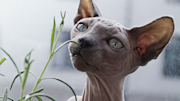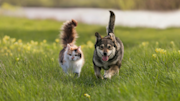What is pet insurance excess?
Pets and plants
How to create a green space without harming your furry friends

Whether you’ve got a large garden, a small courtyard with room for some pots or you’re looking to brighten up your flat, it’s important to think about your pets when picking your plants.
Dogs, cats and other pets are naturally curious and many will happily munch on a leaf or flower to see whether it’s a tasty treat. Unfortunately, this curiosity can come at a price as there are plenty of plants that are potentially harmful to your pets.
Plants to avoid
Among the common garden plants that are best avoided are daffodils, foxgloves and geraniums. Many plants grown from bulbs like hyacinths, tulips and snowdrops are also harmful for pets, with the bulbs particularly toxic.
Lilies are another to be kept out of your pet’s way, both in the garden and as a cut flower indoors. All parts of the plant including the pollen can be poisonous, with cats particularly at risk.
Some house plants can also be bad for your pets. Although it’s known for its healing properties in humans, aloe vera is toxic to cats and dogs.
Sago palms are a no-no too, as these can cause vomiting and liver failure if ingested in large enough quantities. Other common house plants that are potentially toxic include amaryllis, fiddle leaf fig and elephant ears.
With any of these, symptoms (include drooling, fits and vomiting) will depend on how much they’ve eaten and how toxic the plant is.
If you're worried that your pet may have eaten something poisonous, speak to your vet. They will be able to advise you on the risk and recommend whether they need treatment.
Pet-friendly plants
As well as avoiding the toxic ones, there are some pet-friendly plants that you might want to add to your borders or stick in a pot. Dogs love to chew on grass and even bamboo but are also partial to herbs such as basil, dill and thyme.
Cats have their favourites too, with catmint and cat grass likely to become their number one places to visit in your garden. They’ll be very happy hanging out with your herbs, which could make them smell divine too.
There are still plenty of non-toxic plants for pets, which you can add to your home or garden. Common types include roses, marigolds, violets and sunflowers.
If you’re in any doubt about which are best for pets, ask at your garden centre or speak to your vet. Animal charity PDSA also has lots of information on its website about the toxic ones.
Adding pet-friendly plants to your home or garden has lots of benefits, but choosing the right ones is key.
To learn more about how we can help protect your home and furry friends, visit our home insurance and pet insurance pages for a quote.
Exclusive offers for Co-op Members

Pet insurance
Co-op Members get 5% off pet insurance.
5% discount applies only to the first year as an introductory offer. Minimum yearly costs apply to receive 5% discount: £51.59 for dogs, £50.68 for cats. Offers may be changed or withdrawn at any time.

Home insurance
Exclusive member price on home insurance.
Your discount is not available on add ons and is applied if your details match those on our membership database.




